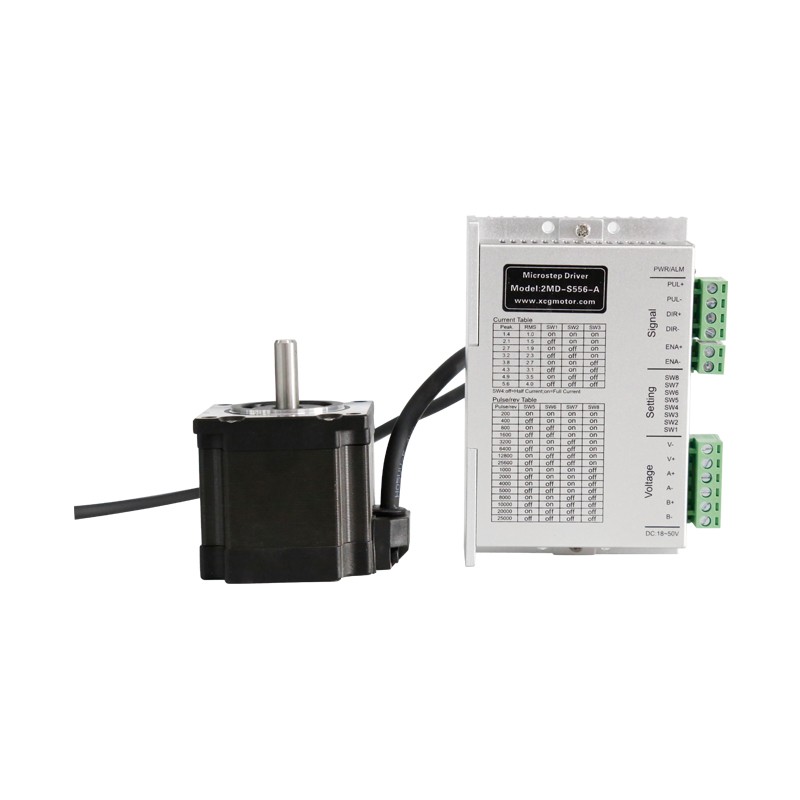Source:Industry News Release time:2022-07-04 Clicks: Popular:Reduction motor manufacturer

The speed of the stepper servo motor depends on the pulse frequency, the number of rotor teeth and the number of beats. Its angular velocity is proportional to the pulse frequency and synchronized with the pulse time. Therefore, when the number of rotor teeth and the number of operating beats are constant, the required rotation speed can be obtained by controlling the pulse frequency. Since the stepper motor starts with its synchronous torque, in order not to lose step, the starting frequency is not high. Especially as the power increases, the rotor diameter increases, the inertia increases, and the difference between the starting frequency and the maximum operating frequency may be as much as 10 times.
In order to give full play to the rapid performance of the motor, the motor is usually started at a frequency lower than the starting frequency, and then the pulse frequency is gradually increased until the required rotation speed is reached. In order to ensure the positioning accuracy of the motor, the motor must gradually reduce the pulse frequency from the highest speed to a speed that can be stopped (equal to or slightly greater than the starting speed) before stopping. Therefore, when a stepper motor drives a load to move a certain distance at high speed and position it accurately, it should generally include five stages: "start-acceleration-high-speed operation (constant speed)-deceleration-stop", and the speed characteristics are usually trapezoidal. If the distance is short, it is a triangular velocity characteristic.
The biggest feature that distinguishes the stepper motor from other control motors is that it can accept digital control signals (electrical pulse signals) and convert them into corresponding angular displacement or linear displacement, so it is an actuator that completes digital conversion.
It can also perform open-loop position control, and input pulse signals to obtain specified position increments. Compared with traditional DC servo systems, the cost of this incremental position control system is significantly reduced and almost no system adjustments are required.
Recommended reading
Advantages and Disadvantages of DC Brushed Motors
Several key technical parameters to measure the performance of planetary reducer
Related Information
CGX115
2021-01-13CGXZK042
2021-01-13Stepper motor
2021-04-14Planetary reducer
2020-12-21Stepper motor
2020-12-21CGXK115
2021-01-13Brake motor
2020-12-21Stepper motor
2020-12-21CGXZK115
2021-01-13Stepper motor
2021-04-14Planetary reducer
2021-04-15Right angle motor
2020-12-21CGH-090L1-10-P1
2020-12-21Planetary reducer
2020-12-21CGXK142
2021-01-13The working method and application characteristics of stepper motors
2022-05-28Introduction to stepper motor driver control chip types
2022-06-13Introduction to cylindrical gear reduction motor
2022-08-24How to limit the current of the corner reducer
2022-11-09Features of reduction motors
2022-08-01Working principle and usage analysis of screw stepper motor
2022-06-15Forms and prevention of reducer gear tooth failure
2022-12-30Stepper motor application considerations
2022-06-17The difference between reduction motor and ordinary motor
2022-08-29Common problems and solutions for right angle reduction motor accessories
2022-10-29Analysis of stepper motor driver
2022-07-06High and low temperature (vacuum) servo motor
2022-03-03How to prevent corrosion of right angle reduction motor
2022-10-27What should you pay attention to before using a right-angle reduction motor?
2022-10-17Solution to sudden failure of reduction motor
2022-09-07